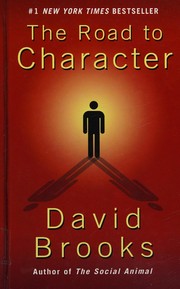Check nearby libraries
Buy this book

New York Times columnist David Brooks examines the deeper values that should inform our lives. Responding to what he calls the culture of the Big Me, which emphasizes external success, Brooks challenges us, and himself, to rebalance the scales between our "resume virtues" -- achieving wealth, fame, and status -- and our "eulogy virtues," those that exist at the core of our being: kindness, bravery, honesty, or faithfulness, focusing on what kind of relationships we have formed. Looking to some of the world's greatest thinkers and inspiring leaders, Brooks explores how, through internal struggle and a sense of their own limitations, they have built a strong inner character. Labor activist Frances Perkins understood the need to suppress parts of herself so that she could be an instrument in a larger cause. Dwight Eisenhower organized his life not around impulsive self-expression but considered self-restraint. Dorothy Day, a devout Catholic convert and champion of the poor, learned as a young woman the vocabulary of simplicity and surrender. Civil rights pioneers A. Philip Randolph and Bayard Rustin learned reticence and the logic of self-discipline, the need to distrust oneself even while waging a noble crusade. Blending psychology, politics, spirituality, and confessional, The Road to Character provides an opportunity for us to rethink our priorities, and strive to build rich inner lives marked by humility and moral depth. "Joy," David Brooks writes, "is a byproduct experienced by people who are aiming for something else. But it comes."
Check nearby libraries
Buy this book

Previews available in: Spanish English
Subjects
SOCIAL SCIENCE / Sociology / General, Humility, PHILOSOPHY / Ethics & Moral Philosophy, Character, Virtues, SELF-HELP / Personal Growth / General, nyt:combined-print-and-e-book-nonfiction=2015-05-03, New York Times bestseller, New York Times reviewed, Self-perception, Virtue and virtues, Conduct of life, Self Concept, SOCIAL SCIENCE, Sociology, General, SELF-HELP, Personal Growth, PHILOSOPHY, Ethics & Moral Philosophy, Virtue, nyt:paperback-nonfiction=2016-10-02, Spanish language materials, Caractère, Vertus, Humilité, Materiales en español, Carácter, Virtudes| Edition | Availability |
|---|---|
| 01 |
zzzz
|
| 02 |
zzzz
|
|
03
Road to Character
2016, Penguin Books, Limited, Penguin Books Ltd, imusti
in English
0141980362 9780141980362
|
zzzz
|
|
04
The Road to Character
Sep 13, 2016, Random House Trade Paperbacks
paperback
0812983416 9780812983418
|
zzzz
|
| 05 |
cccc
|
|
06
The road to character
2015, Allen Lane, an imprint of Penguin Books
in English
0241186722 9780241186725
|
eeee
|
| 07 |
aaaa
|
| 08 |
zzzz
|
| 09 |
zzzz
|
| 10 |
eeee
|
Book Details
Table of Contents
Edition Notes
Includes bibliographical references (pages 541-567) and index.
Classifications
The Physical Object
ID Numbers
Source records
marc_openlibraries_sanfranciscopubliclibrary MARC recordLibrary of Congress MARC record
Internet Archive item record
Promise Item
Work Description
With the wisdom, humor, curiosity, and sharp insights that have brought millions of readers to his New York Times column and his previous bestsellers, David Brooks has consistently illuminated our daily lives in surprising and original ways. In The Social Animal, he explored the neuroscience of human connection and how we can flourish together. Now, in The Road to Character, he focuses on the deeper values that should inform our lives. Responding to what he calls the culture of the Big Me, which emphasizes external success, Brooks challenges us, and himself, to rebalance the scales between our "resume virtues" -- achieving wealth, fame, and status -- and our "eulogy virtues," those that exist at the core of our being: kindness, bravery, honesty, or faithfulness, focusing on what kind of relationships we have formed. Looking to some of the world's greatest thinkers and inspiring leaders, Brooks explores how, through internal struggle and a sense of their own limitations, they have built a strong inner character. Labor activist Frances Perkins understood the need to suppress parts of herself so that she could be an instrument in a larger cause. Dwight Eisenhower organized his life not around impulsive self-expression but considered self-restraint. Dorothy Day, a devout Catholic convert and champion of the poor, learned as a young woman the vocabulary of simplicity and surrender. Civil rights pioneers A. Philip Randolph and Bayard Rustin learned reticence and the logic of self-discipline, the need to distrust oneself even while waging a noble crusade. Blending psychology, politics, spirituality, and confessional, The Road to Character provides an opportunity for us to rethink our priorities, and strive to build rich inner lives marked by humility and moral depth. "Joy," David Brooks writes, "is a byproduct experienced by people who are aiming for something else. But it comes." - Publisher.
Links outside Open Library
Community Reviews (0)
History
- Created July 19, 2019
- 5 revisions
Wikipedia citation
×CloseCopy and paste this code into your Wikipedia page. Need help?
| March 3, 2024 | Edited by Tom Morris | Merge works |
| December 8, 2022 | Edited by ImportBot | import existing book |
| February 15, 2022 | Edited by ImportBot | import existing book |
| September 21, 2020 | Edited by MARC Bot | import existing book |
| July 19, 2019 | Created by MARC Bot | Imported from marc_openlibraries_sanfranciscopubliclibrary MARC record |



















